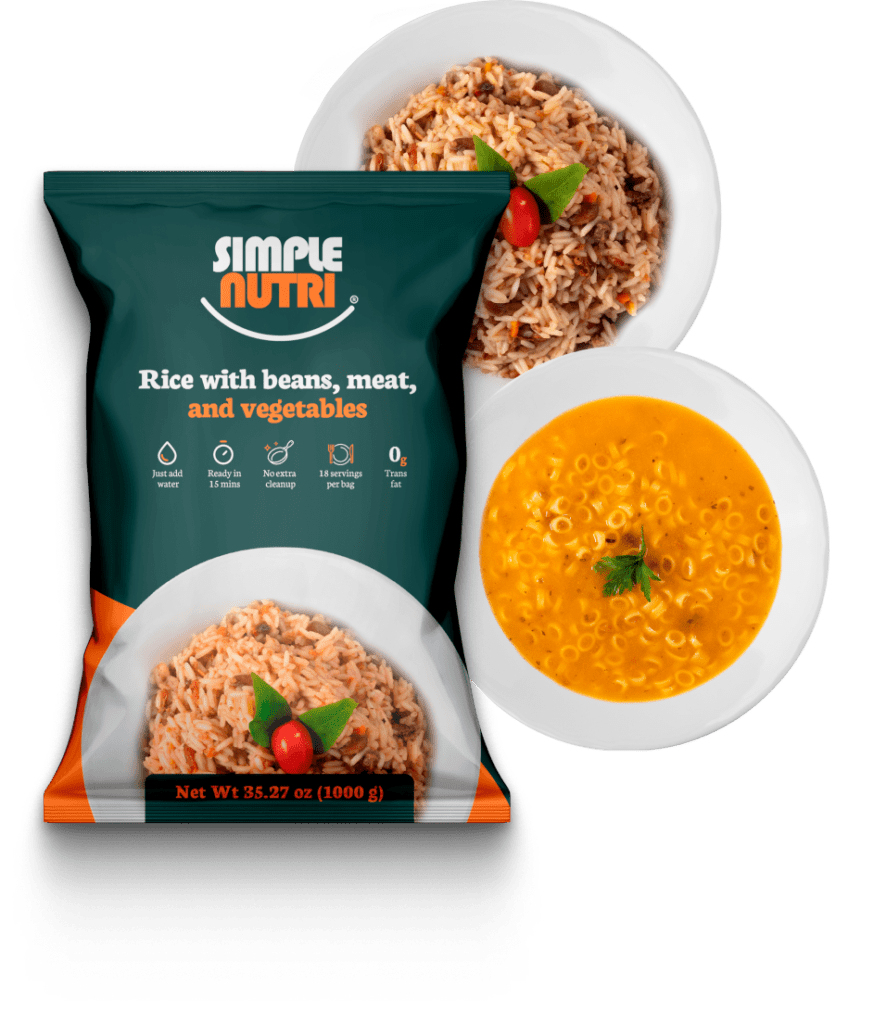Início Products
Products
Our dehydrated meals preserve the macronutrients and most of the micronutrients and are prepared in accordance with the guidelines of the World Health Organization. We create menus that respect the culinary traditions of each region, allowing recipes to be customized with natural ingredients and nutritional adjustments according to specific needs.
Dehydration is mankind’s oldest method for preserving food. Our technique does not make use of preservatives and additives that are harmful to health, such as those used in ultra-processed foods found on the shelves.
In contrast to the approach generally associated with the ultra-processed food industry, our meals are carefully designed, encouraging family farming and social inclusion.

SOLUTIONS
Simple and easy
to prepare.
Find out more about our range of solutions.
Risotto
Mixture of rice with animal protein and vegetables, enriched with vitamins and minerals.
Soup
Mix for preparing corn porridge with coconut, enriched with vitamins and minerals
Porridge
Mix for preparing noodle soup with animal protein and vegetables, enriched with vitamins and minerals.
Chopped
Potato mince with animal and vegetable protein, vegetables, enriched with vitamins and minerals.
READY-TO-USE SOLUTIONS
Our solutions for malnutrition
Simple Nutri is committed to eradicate malnutrition across the world, with a range of ready-to-use products as per WHO and UN recommendations.
RUTF
Ideal for: Severe acute malnutrition in children above 6 months of age.
RUSF
Ideal for: Management of moderately malnourished children above 6 months of age.
LNS-MQ
Ideal for: Supplementation to breast feeding and local food to prevent acute malnutrition above 6 months of age.
BENEFITS
Benefits of our solutions
Nutrient preservation
Dehydrated foods preserve macronutrients during the dehydration process, ensuring adequate nutritional support for those in emergency situations.
Better durability and storage
Dehydration extends the shelf life of foods, making them a practical choice for situations where long-term storage is necessary and refrigeration conditions are limited or nonexistent.
Reduced weight and volume
Dehydrated foods are lightweight and compact, allowing large quantities to be transported and distributed efficiently in remote or disaster-affected locations.
Adequate caloric supply
In crisis situations, it is crucial to provide enough calories to maintain the energy and health of those affected. Dehydrated foods often have higher calorie density, which can be vital for survival.
Easy preparation
Dehydrated foods require little or no additional preparation, saving time, resources and the need for kitchen utensils.
Diversity of options
Dehydrated foods can be produced with a variety of ingredients, allowing the specific nutritional needs of different population groups to be met.
Quick answer
The large-scale production of dehydrated food allows for a quick and effective response to emergencies, ensuring that food aid reaches people in need as quickly as possible.
Cultural acceptance
In some cultures, dehydrated foods can be part of the traditional diet, facilitating acceptance and incorporation into the diet of affected communities.
Waste reduction
Dehydrated foods have a prolonged shelf life, minimizing food waste that could occur with perishable products.
Facilities
With over two decades of expertise, our production focuses on nutritional efficiency. Certified by the main global regulatory bodies, we follow the highest standards, in accordance with the recommendations of the World Health Organization.